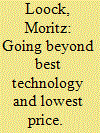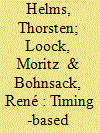| Srl | Item |
| 1 |
ID:
117321


|
|
|
|
|
| Publication |
2013.
|
| Summary/Abstract |
Implementing smart metering is an important field for energy policy to successfully meet energy efficiency targets. From an integrated social acceptance and customer-perceived value theory perspective we model the importance of customer value of smart metering in this regard. We further shape the model on a choice-based conjoint experiment with Swiss private electricity customers. The study finds that overall customers perceive a positive value from smart metering and are willing to pay for it. Further, based on a cluster analysis of customers' value perceptions, we identify four customer segments, each with a distinct value perception profile for smart metering. We find that energy policy and management should integrate a solid understanding of customer value for smart metering in their initiatives and consider different smart metering market segments within their measures.
|
|
|
|
|
|
|
|
|
|
|
|
|
|
|
|
| 2 |
ID:
111057


|
|
|
|
|
| Publication |
2012.
|
| Summary/Abstract |
Renewable energy is becoming increasingly important for economies in many countries. But still in an emerging industry, renewable energy requires supportive energy policy helping firms to develop and protect competitive advantages in global competition. As a guideline for designing such policy, we consult well-informed stakeholders within the renewable energy industry: investors. Their preferences serve as explorative indicator for assessing which business models might succeed in competition. To contribute to only limited research on renewable energy investors' preferences, we ask, which business models investment managers for renewable energy prefer to invest in. We report from an explorative study of 380 choices of renewable energy investment managers. Based on the stated preferences, we modelled three generic business models to calculate the share of investors' preferences. We find exiting evidence: a "customer intimacy" business model that proposes best services is much more preferred by investors than business models that propose lowest price or best technology. Policy-makers can use those insights for designing policy that supports service-driven business models for renewable energy with a scope on customer needs rather than technology or price. Additionally, we state important implications for renewable energy entrepreneurs, managers and research.
|
|
|
|
|
|
|
|
|
|
|
|
|
|
|
|
| 3 |
ID:
150440


|
|
|
|
|
| Summary/Abstract |
Energy policies in many countries push for an increase in the generation of wind and solar power. Along these developments, the balance between supply and demand becomes more challenging as the generation of wind and solar power is volatile, and flexibility of supply and demand becomes valuable. As a consequence, companies in the electric power sector develop new business models that create flexibility through activities of timing supply and demand. Based on an extensive qualitative analysis of interviews and industry research in the energy industry, the paper at hand explores the role of timing-based business models in the power sector and sheds light on the mechanisms of flexibility creation through timing. In particular we distill four ideal-type business models of flexibility creation with timing and reveal how they can be classified along two dimensions, namely costs of multiplicity and intervention costs. We put forward that these business models offer ‘coupled services’, combining resource-centered and service-centered perspectives. This complementary character has important implications for energy policy.
|
|
|
|
|
|
|
|
|
|
|
|
|
|
|
|